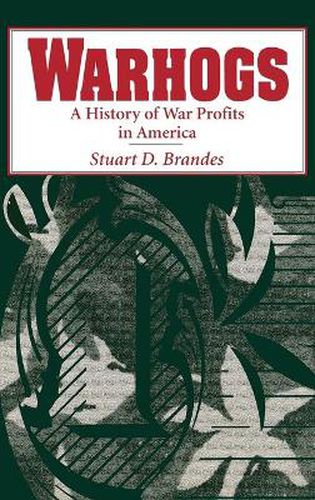Readings Newsletter
Become a Readings Member to make your shopping experience even easier.
Sign in or sign up for free!
You’re not far away from qualifying for FREE standard shipping within Australia
You’ve qualified for FREE standard shipping within Australia
The cart is loading…






The Puritans condemned war profiteering as a Provoking Evil, George Washington feared that it would ruin the Revolution, and Franklin D. Roosevelt promised many times that he would never permit the rise of another crop of war millionaires. Yet on every occasion that American soldiers and sailors served and sacrificed in the field and on the sea, other Americans cheerfully enhanced their personal wealth by exploiting every opportunity that wartime circumstances presented. In Warhogs, Stuart D. Brandes masterfully blends intellectual, economic, and military history into a fascinating discussion of a great moral question for generations of Americans: Can some individuals rightly profit during wartime while others sacrifice their lives to protect the nation? Drawing upon a wealth of manuscript sources, newspapers, contemporary periodicals, government reports, and other relevant literature, Brandes traces how each generation in financing its wars has endeavored to assemble resources equitably, to define the ethical questions of economic mobilization, and to manage economic sacrifice responsibly. He defines profiteering to include such topics as price gouging, quality degradation, trading with the enemy, plunder, and fraud, in order to examine the different guises of war profits and the degree to which they have existed from one era to the next. This far-reaching discussion moves beyond a linear narrative of the financial schemes that have shaped this nation’s capacity to make war to an in-depth analysis of American thought and culture. Those scholars, students, and general readers interested in the interaction of legislative, economic, social, and technological events with the military establishment will find no other study that so thoroughly surveys the story of war profits in America.
$9.00 standard shipping within Australia
FREE standard shipping within Australia for orders over $100.00
Express & International shipping calculated at checkout
The Puritans condemned war profiteering as a Provoking Evil, George Washington feared that it would ruin the Revolution, and Franklin D. Roosevelt promised many times that he would never permit the rise of another crop of war millionaires. Yet on every occasion that American soldiers and sailors served and sacrificed in the field and on the sea, other Americans cheerfully enhanced their personal wealth by exploiting every opportunity that wartime circumstances presented. In Warhogs, Stuart D. Brandes masterfully blends intellectual, economic, and military history into a fascinating discussion of a great moral question for generations of Americans: Can some individuals rightly profit during wartime while others sacrifice their lives to protect the nation? Drawing upon a wealth of manuscript sources, newspapers, contemporary periodicals, government reports, and other relevant literature, Brandes traces how each generation in financing its wars has endeavored to assemble resources equitably, to define the ethical questions of economic mobilization, and to manage economic sacrifice responsibly. He defines profiteering to include such topics as price gouging, quality degradation, trading with the enemy, plunder, and fraud, in order to examine the different guises of war profits and the degree to which they have existed from one era to the next. This far-reaching discussion moves beyond a linear narrative of the financial schemes that have shaped this nation’s capacity to make war to an in-depth analysis of American thought and culture. Those scholars, students, and general readers interested in the interaction of legislative, economic, social, and technological events with the military establishment will find no other study that so thoroughly surveys the story of war profits in America.